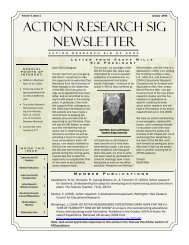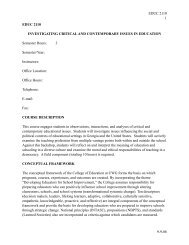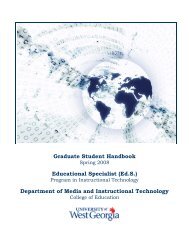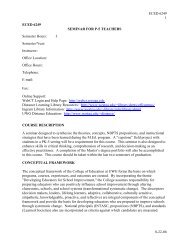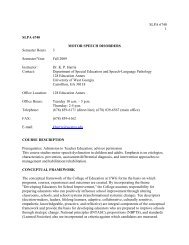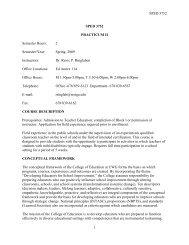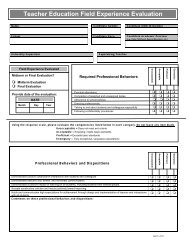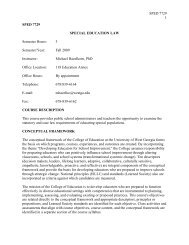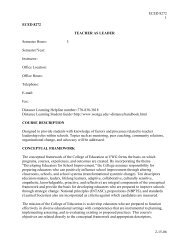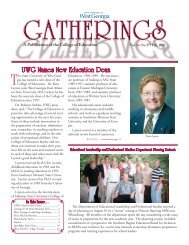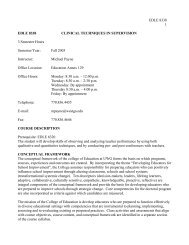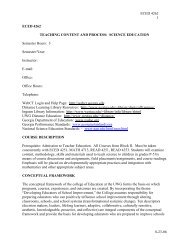PDF Format - College of Education
PDF Format - College of Education
PDF Format - College of Education
Create successful ePaper yourself
Turn your PDF publications into a flip-book with our unique Google optimized e-Paper software.
MEDT 6487<br />
Semester Hours: 3<br />
Semester/Year:<br />
Instructor:<br />
Office Location:<br />
Office Hours:<br />
Telephone:<br />
Fax:<br />
E-mail:<br />
PRACTICUM<br />
Distance Support: WebCT VISTA Home Page<br />
http://webct.westga.edu ,<br />
Web CT VISTA Help & Troubleshooting (678-839-6248)<br />
http://www.westga.edu/~distance/webct2/help, or<br />
http://help.view.usg.edu (Click on “Request Support” for live chat)<br />
UWG Distance Learning<br />
http://www.westga.edu/~distance ,<br />
Distance Learning Library Services<br />
http://www.westga.edu/~library/depts/<strong>of</strong>fcampus/ ,<br />
Ingram Library Services<br />
http://www.westga.edu/~library<br />
COURSE DESCRIPTION<br />
MEDT 6487<br />
Page 1<br />
Current issues in school media centers will be examined. Documentation <strong>of</strong> all field experiences<br />
completed throughout the program will be compiled. An electronic program portfolio will be<br />
developed and prepared for sharing with peers and instructors. This course must be taken during<br />
the last semester <strong>of</strong> the program.<br />
CONCEPTUAL FRAMEWORK<br />
The conceptual framework <strong>of</strong> the <strong>College</strong> <strong>of</strong> <strong>Education</strong> at UWG forms the basis on which programs,<br />
courses, experiences, and outcomes are created. By incorporating the theme “Developing Educators<br />
for School Improvement,” the <strong>College</strong> assumes responsibility for preparing educators who can<br />
positively influence school improvement through altering classrooms, schools, and school systems<br />
(transformational systemic change). Ten descriptors (decision makers, leaders, lifelong learners,<br />
adaptive, collaborative, culturally sensitive, empathetic, knowledgeable, proactive, and reflective) are
MEDT 6487<br />
Page 2<br />
integral components <strong>of</strong> the conceptual framework and provide the basis for developing educators who<br />
are prepared to improve schools through strategic change. National principles (INTASC),<br />
propositions (NBPTS), and standards (Learned Societies) also are incorporated as criteria against<br />
which candidates are measured.<br />
The mission <strong>of</strong> the <strong>College</strong> <strong>of</strong> <strong>Education</strong> is to develop educators who are prepared to function<br />
effectively in diverse educational settings with competencies that are instrumental to planning,<br />
implementing, assessing, and re-evaluating existing or proposed practices. This course’s objectives<br />
are related directly to the conceptual framework and appropriate descriptors, principles or<br />
propositions, and Learned Society standards are identified for each objective. Class activities and<br />
assessments that align with course objectives, course content, and the conceptual framework are<br />
identified in a separate section <strong>of</strong> the course syllabus.<br />
COURSE OBJECTIVES<br />
Students will:<br />
1. document experience in all phases <strong>of</strong> the day-to-day operation <strong>of</strong> the school library media center<br />
(AASL, 2003)<br />
(D1 decision maker, D2 leader, D3 lifelong learner, D4 adaptive, D5 collaborative, D6 culturally<br />
sensitive, D7 empathetic, D8 knowledgeable, D9 proactive, D10 reflective; NBPTS 3, 4; AASL<br />
1.1, 1.2, 1.3, 1.4, 2.1, 2.2, 2.3, 3.1, 3.2, 3.3, 4.1, 4.2, 4.3);<br />
2. document knowledge <strong>of</strong> media center responsibilities in the school library media center (AASL,<br />
2003)<br />
(D1 decision maker, D2 leader, D3 lifelong learner, D4 adaptive, D5 collaborative, D6 culturally<br />
sensitive, D7 empathetic, D8 knowledgeable, D9 proactive, D10 reflective; NBPTS 3, 4; AASL<br />
1.1, 1.2, 1.3, 1.4, 2.1, 2.2, 2.3, 3.1, 3.2, 3.3, 4.1, 4.2, 4.3);<br />
3. document collaboration with classroom teachers, media specialists, and technology specialists<br />
(AASL, 2003)<br />
(D1 decision maker, D2 leader, D3 lifelong learner, D4 adaptive, D5 collaborative, D6 culturally<br />
sensitive, D7 empathetic, D8 knowledgeable, D9 proactive, D10 reflective; NBPTS 3, 4; AASL<br />
2.1, 2.2, 3.2);<br />
4. describe appropriate service <strong>of</strong> special needs and multicultural groups in the school library media<br />
center (i. e., language minority students and/or individuals with either visual disability, physical<br />
disability, learning disability, or speech and hearing impairment) (AASL, 2003)<br />
(D1 decision maker, D2 leader, D3 lifelong learner, D4 adaptive, D5 collaborative, D6 culturally<br />
sensitive, D7 empathetic, D8 knowledgeable, D9 proactive, D10 reflective; NBPTS 3, 4; AASL<br />
2.1).<br />
5. develop a pr<strong>of</strong>essional portfolio reflecting the course work and field experience activities they<br />
completed throughout the program (AASL, 2003)<br />
(D1 decision maker, D2 leader, D3 lifelong learner, D4 adaptive, D5 collaborative, D6 culturally<br />
sensitive, D7 empathetic, D8 knowledgeable, D9 proactive, D10 reflective; NBPTS 1, 2, 3, 4, 5;<br />
AASL 1.1, 1.2, 1.3, 1.4, 2.1, 2.2, 2.3, 3.1, 3.2, 3.3, 4.1, 4.2, 4.3)
TEXTS, READINGS, AND INSTRUCTIONAL RESOURCES<br />
Required Text:<br />
MEDT 6487<br />
Page 3<br />
American Association <strong>of</strong> School Librarians and Association for <strong>Education</strong>al Communications and<br />
Technology. (1998). Information power: Partnerships for learning. Chicago: American<br />
Library Association.<br />
Student Micros<strong>of</strong>t Agreement – Office S<strong>of</strong>tware Package: http://www.westga.edu/~mcastu/<br />
References:<br />
American Association <strong>of</strong> School Librarians. (n.d.). AASL position statements. Retrieved May 8, 2003<br />
from http://www.ala.org/aasl/positions/index.html<br />
Andronik, C. (ed.). (2003). School library management. (5th ed.). Worthington, OH: Linworth.<br />
Bradburn, F. (1999). Output measures for school library media programs. New York: Neal-Schuman.<br />
Erikson, R., & Markuson, C. (2001). Designing a school library media center for the future. Chicago:<br />
American Library Association.<br />
Everhart, N. (1998). Evaluating the school library media center. Westport, CT: Libraries Unlimited.<br />
Farmer, L. S. J. (2001). Teaming with opportunity: Media programs, community constituencies, and<br />
technology. Westport, CT: Libraries Unlimited.<br />
Lankford, M. (ed.). (2006). Leadership and the school librarian: Essays from leaders in the field.<br />
Worthington, OH: Linworth.<br />
Media specialist handbook (1990). Atlanta, GA: Georgia Department <strong>of</strong> <strong>Education</strong>.<br />
Morris, B. J. (2004). Administering the school library media center (4th ed.). Westport, CT: Libraries<br />
Unlimited.<br />
Public <strong>Education</strong> Network & American Association <strong>of</strong> School Librarians. (2001). The Information-<br />
Powered School. Chicago: American Library Association.<br />
Salmon, S. (1996). Power up your library: creating the school library media program. Westport, CT:<br />
Libraries Unlimited.<br />
Santa Clara County Office <strong>of</strong> <strong>Education</strong>, Library Services. (2001). Where Do I start? A School library<br />
handbook. Worthington, OH: Linworth Publishing.<br />
Stein, B. L., & Brown, W. (2002). Running a school library media center (2nd ed.) New York: Neal-<br />
Schuman.<br />
Wasman, A. M. (1998). New steps to service: Commonsense advice for the school library media<br />
specialist. Chicago: American Library Association.<br />
ACTIVITIES AND ASSESSMENTS, EVALUATION PROCEDURES, AND GRADING<br />
POLICY<br />
Link to Conceptual Framework. The focus <strong>of</strong> this course is to provide students with the<br />
opportunity to compile the documentation <strong>of</strong> their participation in all the day-to-day aspects <strong>of</strong><br />
running a school library media center. As students participate in the course they will have<br />
demonstrated achievement as decision maker: special needs and multicultural discussions, PowerPoint<br />
on the Role <strong>of</strong> the Media Specialist (course activities 5, 9); leader: activities checklist, PowerPoint on<br />
the Role <strong>of</strong> the Media Specialist (course activities 4,9); lifelong learner: completion <strong>of</strong> all course<br />
requirements particularly those requiring the student to explore and locate new information (course<br />
activities 1, 2, 3, 4, 5, 6, 7, 8, 9, 10); adaptive: completion <strong>of</strong> assignment specific to services provided
MEDT 6487<br />
Page 4<br />
to meet special needs and multicultural needs (course activity 5); collaborative: completion <strong>of</strong><br />
assignment related to the collaborative development <strong>of</strong> instructional plans (course activity 8);<br />
culturally sensitive: completion <strong>of</strong> assignment specific to multicultural needs being served (course<br />
activity 5); empathetic: completion <strong>of</strong> online discussions and reflections (course activities 1, 5);<br />
knowledgeable: completion <strong>of</strong> assignments reflecting knowledge and<br />
understanding <strong>of</strong> the roles <strong>of</strong> the media center and the media specialist and the electronicvportfolio<br />
presentation (course activities 7, 9, 10); proactive: PowerPoint on the Role <strong>of</strong> the Media Specialist and<br />
PowerPoint Highlighting Media Center (course activities 7, 9); reflective: participation in online and<br />
face to face discussions, special needs and multicultural reflections, PowerPoint on the Role <strong>of</strong> the<br />
Media Specialist, and electronic portfolio (course activities 1, 5, 9, 10).<br />
Activities and Assessments:<br />
You have already completed all or most <strong>of</strong> the field experience hours in conjunction with courses<br />
you have already completed or are completing in conjunction with courses you are taking this<br />
semester. All <strong>of</strong> these field experience hours accumulate to meet the field experience<br />
requirement for certification. You have been submitting the required field experience log and<br />
reflections in each course. You should have participated in ALL PHASES <strong>of</strong> the school library<br />
media center during this program. At some time during your program you must have spent at<br />
least two full days in a media center from opening to closing. You also must have spent some<br />
time at all three levels; elementary, middle school, and high. This provides an opportunity for<br />
you to visit other schools in or outside your district. The school library media centers in which<br />
you have spent time must be public schools and the media specialist must hold a clear renewable<br />
certificate in school library media.<br />
Assignments<br />
1. Participation in Face to Face and Online Activities<br />
Student will attend the two required face to face sessions and will participate in all assigned<br />
online activities.<br />
(Objectives 1, 2, 3, 4, 5; knowledge, disposition; checklist)<br />
2. Compiled Field Experience Log<br />
Students will compile the time log information they have been keeping throughout the<br />
program.<br />
(Objectives 1, 2, 3, 4, 5; knowledge, skills, disposition; checklist)<br />
3. Compiled Field Experience Reflections and Summary Reflection<br />
Students will write a summary reflection based on the various field experience opportunities<br />
they have had throughout the program.<br />
(Objectives 1, 2, 3, 4, 5; knowledge, skills, disposition; checklist)<br />
4. Activities Checklist<br />
Students have been keeping track <strong>of</strong> the various types <strong>of</strong> activities completed during their field<br />
experience opportunities. Students will compile that information onto one compilation form.<br />
(Objectives 1, 2, 3, 4; knowledge, skills, disposition; checklist)<br />
5. Special Needs and Multicultural Reflections
Students will participate in online discussions regarding the types <strong>of</strong> services and materials<br />
necessary and actually available to students with a variety <strong>of</strong> special needs and to students<br />
from various cultural backgrounds. Following the online discussions, students will write a<br />
reflection based on the discussion and their own experiences and observations.<br />
(Objectives 4; knowledge, skills, disposition; observation, checklist)<br />
6. Resume<br />
Following the standard resume format students will create an up-to-date resume. Keep in<br />
mind that the goal is to be hired as a school library media specialist.<br />
(Objectives 1, 2, 3; knowledge, skills, disposition; checklist)<br />
MEDT 6487<br />
Page 5<br />
7. PowerPoint Highlighting Media Center<br />
Using PowerPoint, create a tour <strong>of</strong> the media center. Photos and descriptions <strong>of</strong> areas,<br />
materials, activities, should be included. Students may also want to record narrative as part <strong>of</strong><br />
your PowerPoint, or use the notes component <strong>of</strong> PowerPoint to describe what has been<br />
documented in the PowerPoint presentation. If people are included in any <strong>of</strong><br />
the photos written permission must be obtained from the parents/guardians <strong>of</strong> students and<br />
from any adults in the photos. Some schools request such permission from parents/guardians<br />
at the beginning <strong>of</strong> each school year. If this is the case, that will take care <strong>of</strong> the permission<br />
required for this assignment. However, make sure permission was granted for each student in<br />
the photo to be photographed. A sample permission form is posted in WebCT which you may<br />
use if needed.<br />
(Objectives 1, 2, 3, 4; knowledge, skills, disposition; rubric)<br />
8. Documentation <strong>of</strong> Work with Students and Teachers<br />
Students have been keeping track <strong>of</strong> their instructional work and interaction with students<br />
related to Information Literacy Standards and Technology Standards as well as the Georgia<br />
QCCs or Georgia Performance Standards. Students will compile their descriptions <strong>of</strong> the<br />
instructional work and document student progress made as a result <strong>of</strong> their instruction and<br />
interaction. Students will also compile their documentation <strong>of</strong> any collaborative activities<br />
with teachers.<br />
(Objectives 1, 2, 3, 4; knowledge, skills, disposition; rubric)<br />
9. PowerPoint on the Role <strong>of</strong> the Media Specialist<br />
As part <strong>of</strong> your Electronic Portfolio, you will develop a PPT with recorded narration on the Role<br />
<strong>of</strong> the Media Specialist. This PPT should reflect the course work you have completed during your<br />
program, your field experience opportunities, and your interpretation <strong>of</strong> Information Power. This<br />
PPT must stand alone – that is, a viewer should be able to review the PPT without you there and<br />
comprehend the message you are trying to communicate.<br />
(Objectives 1, 2, 3, 4, 5; knowledge, skills, disposition; rubric)<br />
10. Electronic Portfolio and Portfolio Presentation<br />
Students will develop an electronic portfolio reflecting their accomplishments throughout the<br />
program based on their course work, field experience opportunities, and reflections. The<br />
electronic portfolio will be shared in class during the last face-to-face meeting.<br />
(Objectives 1, 2, 3, 4, 5; knowledge, skills, disposition; rubric)
MEDT 6487<br />
Page 6<br />
IMPORTANT: It is important that you take your writing in this class very seriously. In addition to<br />
the criteria delineated above, structural, grammar, and/or mechanical errors will result in a loss <strong>of</strong><br />
points. Papers or projects with numerous structural, grammar or mechanical errors will NOT pass. If<br />
you are not a very good writer, you will need to find a writing tutor or helper to pro<strong>of</strong>read your papers.<br />
If you are concerned about your writing pr<strong>of</strong>iciency, please make use <strong>of</strong> the UWG Writing Center or a<br />
personal tutor.<br />
Evaluation Procedures:<br />
Students will be evaluated in the following areas:<br />
Activity/Assignment % Assessment Due Date<br />
1. Participation in face to face and online activities 5 Checklist<br />
2. Compiled Field Experience Log 5 Checklist<br />
3. Compiled Field Experience Reflections and a<br />
10 Rubric<br />
Summary Reflection<br />
4. Activities Checklist 5 Checklist<br />
5. Special Needs and Multicultural Reflections 5 Checklist<br />
6. Resume 5 Checklist<br />
7. PowerPoint Highlighting Media Center 10 Checklist<br />
8. Summary <strong>of</strong> Documentation <strong>of</strong> Work with<br />
10 Checklist<br />
Students/Teachers<br />
9. PowerPoint on the Role <strong>of</strong> the Media Specialist 15 Checklist<br />
10. Electronic Portfolio & Portfolio Presentation 30 Rubric<br />
Total % 100<br />
Grading Policy:<br />
Students satisfactorily completing all assignments and receiving satisfactory evaluations by the<br />
university supervisor and the supervising media specialist receive a grade <strong>of</strong> “S”. Failure to<br />
complete all assignments satisfactorily results in a grade <strong>of</strong> “U”.<br />
CLASS POLICIES<br />
Students are expected to conduct themselves pr<strong>of</strong>essionally. This is an essential quality for all<br />
pr<strong>of</strong>essionals who work in the schools. Pr<strong>of</strong>essionalism includes, but is not limited to, the following:<br />
Participating in interactions and class activities in the face to face or online environment in a<br />
positive manner.<br />
Collaborating and working equitably with fellow students in the class.<br />
Actively participating in class each week.<br />
Turning in assignments on time.<br />
Arriving at on campus classes punctually.<br />
Treating class members and colleagues with respect in and out <strong>of</strong> the virtual and physical<br />
classroom.<br />
Eliminating interruptions in campus classrooms. This includes cell phones and beepers.
MEDT 6487<br />
Page 7<br />
If you have a valid reason for missing class, please contact the instructor in advance. Since this class<br />
meets on campus only three times (including the initial meeting), missing the second or third class will<br />
seriously impact the student’s ability to complete the course satisfactorily and will be approved only<br />
for medical or other emergencies.<br />
Students must use Micros<strong>of</strong>t Office application s<strong>of</strong>tware (Word, PowerPoint, etc.) to complete written<br />
and other assignments. The Micros<strong>of</strong>t Office s<strong>of</strong>tware is available to UWG students free <strong>of</strong> charge<br />
(funded by technology fees). If you do not have Micros<strong>of</strong>t Office, information about acquiring it is<br />
available at http://www.westga.edu/~mcastu/ .<br />
All formal email communication between instructor and students (outside <strong>of</strong> WebCT VISTA) will be<br />
through campus email (your myUWG email account). This is a University policy, so it is imperative<br />
you check your myUWG email account regularly.<br />
Coursework that will be completed in another course that dovetails with an assignment in this course<br />
may be submitted if prior approval is granted by the instructor during the first 10 days <strong>of</strong> class (prior<br />
to June 15). If you foresee this possibility, contact the instructor as soon as possible to request<br />
approval for dual submission. Extra credit activities are not available in this course.<br />
Disabilities Pledge<br />
I pledge to do my best to work with the University to provide all students with equal access to my<br />
classes and materials, regardless <strong>of</strong> special needs, temporary or permanent disability, special needs<br />
related to pregnancy, etc.<br />
If you have any special learning needs, particularly (but not limited to) needs defined under the<br />
American Disabilities Act, and require specific accommodations, please make these known to me,<br />
either directly, or through the Coordinator <strong>of</strong> Disability Services, Dr. Ann Richards. Students with<br />
documented special needs may expect accommodation in relation to classroom accessibility,<br />
modification <strong>of</strong> testing, special test administration, etc. This is not only my personal committment, it is<br />
your right, and it is the law!<br />
TENTATIVE CLASS OUTLINE<br />
Dates in Bold indicate on-campus sessions.<br />
June 4<br />
WebCT Vista<br />
Week Activity Assignments Due<br />
* Review Syllabus & WebCT Vista course materials<br />
* Review field experience documentation from<br />
previous courses<br />
* Compile field experience log from previous<br />
courses to date<br />
* Compile activities checklist from previous courses<br />
to date<br />
* Complete field experience information sheet and<br />
proposed summer work plan<br />
* Schedule June 6 chat with instructor<br />
* Field experience<br />
information sheet<br />
* Electronic copies <strong>of</strong> all<br />
Field Experience<br />
documentation from previous<br />
courses<br />
*Field experience log to date<br />
*Activities checklist to date
June 6<br />
WebCT Vista<br />
June 11<br />
WebCT Vista<br />
June 13<br />
Campus<br />
June 18<br />
WebCT Vista<br />
June 20<br />
WebCT Vista<br />
* Meet with instructor via telephone or WebCT chat<br />
to review field experience components already<br />
completed and finalize summer work plan<br />
* Work on Resume<br />
* Review Electronic Portfolio Matrix<br />
* Compile Field Experience Reflections from prior<br />
courses into one document, and begin work on<br />
Summary Reflection (this activity should continue<br />
throughout the semester)<br />
*Work on Resume<br />
* Students completing M.Ed. program will<br />
receive the Orals Questions<br />
MEDT 6487<br />
Page 8<br />
* Final summer work plan<br />
* Participate in online<br />
discussion<br />
* Electronic Portfolio Workshop * Bring electronic copies <strong>of</strong><br />
items in Foliotek or<br />
Foliotek access information,<br />
and electronic copies <strong>of</strong> other<br />
materials for Electronic<br />
* Work on PowerPoint <strong>of</strong> Media Center<br />
* Work on Electronic Portfolio (ongoing throughout<br />
remainder <strong>of</strong> semester)<br />
* Continue work on PowerPoint <strong>of</strong> Media Center<br />
* Work on PowerPoint on the Role <strong>of</strong><br />
the Media Specialist (ongoing throughout remainder<br />
<strong>of</strong> semester)<br />
June 22 Applications for fall 2007 graduation are due!<br />
June 25<br />
WebCT Vista<br />
June 27<br />
WebCT Vista<br />
July 2<br />
WebCT Vista<br />
* Gather Documentation <strong>of</strong> work with<br />
Students and Teachers<br />
*Work on summary <strong>of</strong> documentation <strong>of</strong> work with<br />
students/teachers (from all field experiences)<br />
* Multicultural discussion<br />
* Complete Multicultural Reflection<br />
July 4 Holiday, No Class<br />
* Special Needs discussion<br />
* Complete Special Needs Reflection<br />
July 5-25 Fall registration on Banweb<br />
July 9<br />
WebCT Vista<br />
* Burn Electronic Portfolio and Role <strong>of</strong> Media<br />
Specialist to CD<br />
Portfolio<br />
* Resume<br />
* Participate in online<br />
discussion<br />
* Participate in online<br />
discussion<br />
* PowerPoint <strong>of</strong> Media<br />
Center<br />
* Participate in online<br />
multicultural discussion<br />
* Multicultural Reflection<br />
* Participate in online<br />
Special Needs discussion<br />
* Special Needs Reflection<br />
* CD copy <strong>of</strong><br />
Electronic Portfolio including<br />
Role <strong>of</strong> Media Specialist &<br />
Orals Questions (M.Ed.<br />
students only)
July 11<br />
WebCT Vista<br />
July 16<br />
Campus<br />
July 18<br />
WebCT Vista<br />
* Update & finalize field experience log and<br />
reflection (for this semester) AND a summary field<br />
experience log and reflection (for all field<br />
experiences)<br />
* Update activities checklist<br />
* Update summary <strong>of</strong> documentation <strong>of</strong> work with<br />
students/teachers<br />
* M.Ed. Oral Exam and Add On Electronic Portfolio<br />
Presentations<br />
* Complete Course and Program Evaluations<br />
MEDT 6487<br />
Page 9<br />
* Compiled Field<br />
Experience Log (semester &<br />
compiled summary)<br />
*Activities Checklist<br />
* Summary <strong>of</strong> documentation<br />
<strong>of</strong> work with students/<br />
teachers<br />
* Compiled Field<br />
Experience Reflections and<br />
Summary Reflection<br />
* Print copy <strong>of</strong> Orals<br />
Questions if completing<br />
the M.Ed. program<br />
* Electronic Portfolio Revision * Final copy <strong>of</strong> Electronic<br />
Portfolio<br />
WebCT course materials will be accessible at http://webct.westga.edu under the WebCT VISTA login.<br />
Students will not be required to come to campus for WebCT VISTA sessions, but will access the<br />
materials online wherever they choose. Internet access will be required!!!<br />
ACADEMIC HONESTY<br />
Students are expected to adhere to the highest standards <strong>of</strong> academic honesty. Plagiarism occurs when<br />
a student uses or purchases ghostwritten papers or projects. It also occurs when a student utilizes the<br />
ideas <strong>of</strong> or information obtained from another person without giving credit to that person. If<br />
plagiarism or another act <strong>of</strong> academic dishonesty occurs, it will be dealt with in accordance with the<br />
academic misconduct policy as stated in the UWG Student Handbook, Undergraduate Catalog , and<br />
Graduate Catalog .<br />
Disciplinary procedures described in the latest University <strong>of</strong> West Georgia Student Handbook will be<br />
followed when violations take place. Infractions may include cheating, plagiarism, disruptive<br />
behavior, and disorderly conduct.



